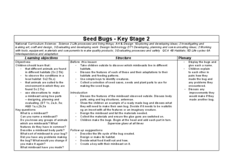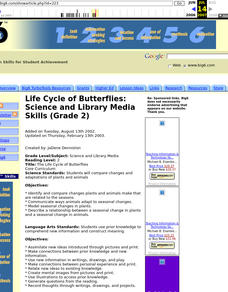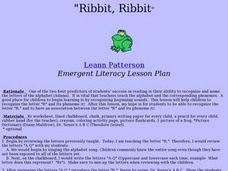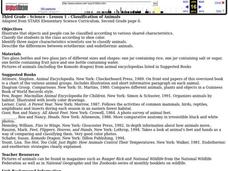Curated OER
Classifying Living and Non-Living Objects
Students investigate living organisms and define the properties of a living species. In this life characteristic lesson, students examine plants in their class and discuss whether or not they are alive. Students create a living vs....
Curated OER
Ecosystem Damage from Household Cleaners
Third graders assess the damage done to various ecosystems by cleaning products and discover how scientists test water quality. Using stream water and common household cleaning agents, they work in groups to test for pH levels. Once...
Curated OER
What's Up at the Rim?
Students are sent on a scavenger hunt to find as many plants as they can in nature.
Curated OER
Predator-Prey Relationships
Students understand ecological systems. They provide experiences to assist citizens to increase their sensitivity and stewardship for the environment.
Curated OER
Marine & Aquatic Habitats Activities - Habitats of Birds, Fish, and Mammals on the Island and the Pacific Region
Students create habitats in jars to understand integral aspects of plants' and animals' habitats.
Curated OER
The Coyote Population: Kansas Prairies
Students discover animal lifestyles by researching their ecosystem. In this animal statistics lesson, students research the geography of Kansas and discuss the reasons why wild animals survive in the open Kansas fields. Students complete...
Curated OER
Seed Bugs; Stage 2
Learners examine nature by participating in an environmental art activity. For this imaginary creature lesson, students discuss the importance of a habitat when pertaining to wild animals or bugs. Learners utilize tree parts which they...
Curated OER
The Effects of Water Quality on the Growth Rate of Freshwater Mussels
Students participate in a field and laboratory study to determine if local freshwater mussels are environmentally stressed.
Curated OER
Flour Beetles
Pupils observe life stages in flour beetles and graph the results. They write a summary report.
Curated OER
pH
Learners use a Colorimetric test to measure pH and gain the importance to life in an aquatic ecosystem pH is. They explore the dramatic effect pH level can have on a water body. Students test the pH level of many water samples.
Curated OER
Matching Flowers With Their Pollinators
Students match flowers to pollinators and construct models of
flowers to demonstrate why different kinds of flowers need different kinds of
pollinators. They use their flower models and the "Scientific Method Format" included in the...
Curated OER
School Yard Park/Ecosystem
Fifth graders observe and categorize different sections of a park and it's ecosystem. In this categorizing lesson plan, 5th graders collect different facets of nature from a nearby park (without disturbing the ecosystem). They map,...
Curated OER
School Yard Park/ Ecosystem
Fifth graders examine ecosystems in their schoolyard. In this nature and ecosystem instructional activity, 5th graders map their schoolyard into workable plots. They classify plants and animals found in the plot. They revisit their site...
Curated OER
Habitat Choice in Woodbugs
Students investigate woodbugs. In this scientific investigation activity, students explore the steps scientists take when conducting an investigation using live specimens. Students explore habitat preferences for woodbugs in various...
Curated OER
Sounds of the Wetlands
Students identify the sounds of different bird calls. For this biology lesson, students create a sound map. They explain how this method is important in tracking wildlife.
Curated OER
Investigating Animals in Water
Students observe small animal activity. They identify local water animals and describe the habitats where water animals can be found. Students collect samples to observe in the classroom.
Curated OER
Types of Legs
Students identify the characteristics of the legs of arthropods as well as how they are used. They compare and contrast the legs of various types of bugs in the arthropod family. A comparison worksheet is included in with this lesson.
Curated OER
Termite Trails
Students observe the behavior of termites and draw conclusions about their behavior. They record data as to termite behavior and recognize elements in the experimental design which must include a hypothesis.
Curated OER
Benthic Macroinvertebrates
Students survey and describe a stream ecosystem. They sample the benthic macroinvertebrate populations of a given stream and determine community structure through the use of the Chandler Index and a species diversity index.
Curated OER
Life Cycle of Butterflies
Students identify ways plants and animals make changes related to the seasons, specifically focusing on the life cycle of butterflies.
Curated OER
Ribbit! Ribbit!
Students research a frog's life cycle and habitat using books, the Internet and lecture. Students make origami frogs, write letters to Toad from Arnold Lobel's "Frog and Toad" and participate in a simulated camouflage activity.
Curated OER
Classification of Animals
Third graders practice classiyfying items and identify three major characteristics scientists use to classify animals. They describe the differences between ectothermic and endothermic animals.
Curated OER
Survivor
Seventh graders investigate changes in the ecosystem within the school year. They see that ecosystems, communities, populations, and organisms are dynamic and change over time. They, in groups, collect data in quadrants in the fall,...
Curated OER
Venom!
High schoolers examine the nature of venom. They conduct an experiment to demonstrate how proteins such as venoms can be denatured using raw eggs, beakers, heated water, and compresses.

























